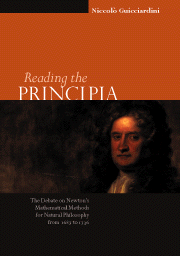 Reading the Principia
Reading the Principia 8 - Basel: challenging the Principia
Published online by Cambridge University Press: 29 March 2010
Summary
Purpose of this chapter
In this chapter we will be concerned with the small group of enthusiasts who extended and promoted Leibniz's calculus at the turn of the century. A handful of mathematicians, mainly based in Basel and Paris, invested their intellectual strengths in the new and controversial algorithm first published in the Acta eruditorum for 1684. Their reaction to the Principia resulted in a clearly stated programme: Newton's demonstrations had to be translated into Leibnizian language. I am interested in understanding not only what these mathematicians achieved, but especially how they justified the relevance of their research programme.
In §8.2 and §8.3 the reader will find some introductory material concerning the Leibnizian school. Then we will move on to consider some results related to the Principia achieved by Varignon (§8.4), Hermann (§8.5) and Johann Bernoulli (§8.6). This rather selective choice of material will allow us to show the following.
Varignon did not prove new results. Nevertheless, his work is important since he insisted publicly on the advantages of adopting Leibniz's calculus in dealing with some of the main themes of the Principia. Varignon stressed the generality of calculus methods.
[…]
- Type
- Chapter
- Information
- Reading the PrincipiaThe Debate on Newton's Mathematical Methods for Natural Philosophy from 1687 to 1736, pp. 195 - 249Publisher: Cambridge University PressPrint publication year: 1999
- 1
- Cited by


